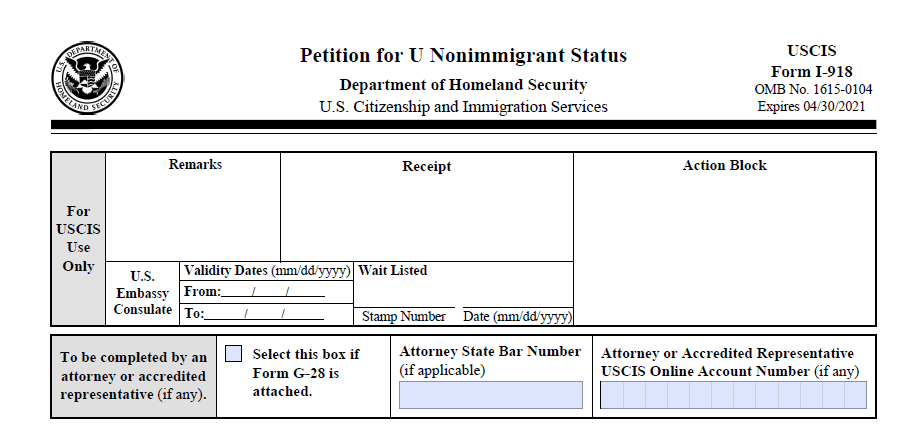The U Visa process is an important benefit for individuals who have been victims of crime in the United States. It allows people, even if undocumented, to request a nonimmigrant status to lawfully reside in the US. It can even provide a waiver for those who entered unlawfully, were deported, or have other immigration issues. That said, the U Visa process is extremely slow and usually does not provide much benefit for several years. This is due to visa limitations and processing delays, which ultimately need to be fixed by Congress.
What is the Typical U Visa Process?
Most U Visa cases include the following steps:
- Request certification from the police, prosecutor, or a judge that you were the victim of a qualifying crime and assisted in reporting that crime
- Send that certification along with other essential forms and documents to USCIS to request U Nonimmigrant Status
- After 4-5 years in most cases, USCIS will issue a preliminary decision. Because sufficient visas are not currently available, most people cannot be approved for U Visas for many years and can only receive a type of temporary status called “deferred action.” This status allows for a work permit.
- Once a visa is available, the person usually receives a notice of approval and a new work permit. Dependent family members in the US are generally also approved. Family abroad may have additional steps to schedule an interview abroad so they can get an actual visa.
This is a typical case as of July of 2020, and things may change in the future. Many cases are more complicated depending on the person’s immigration history, whether they are in removal proceedings (deportation), or if they receive a request for evidence or denial of a waiver.
What Kinds of Crimes Qualify for a U Visa?
There is a long list of crimes that are considered to be qualifying crimes for a U Visa. It is extremely important to consider this requirement before filing because the denial of a U Visa application can bring consequences, including, deportation. An approved certification form does not mean that a crime was a qualifying one, and USCIS does not have to agree with the police’s decision to certify someone.
Additionally, it is not always simple to analyze what is considered a qualifying crime. Crimes often go by different names in different states. Police may also investigate one crime which doesn’t qualify but another crime was actually committed.
The list of crimes is below:
- Abduction
- Abusive Sexual Contact
- Blackmail
- Domestic Violence
- Extortion
- False Imprisonment
- Female Genital Mutilation
- Felonious Assault
- Fraud in Foreign Labor Contracting
- Hostage
- Incest
- Involuntary Servitude
- Kidnapping
- Manslaughter
- Murder
- Obstruction of Justice
- Peonage
- Perjury
- Prostitution
- Rape
- Sexual Assault
- Sexual Exploitation
- Slave Trade
- Stalking
- Torture
- Trafficking
- Witness Tampering
- Unlawful Criminal Restraint
- Other Related Crimes
Can You Request A Waiver With A U Visa Application?
One of the main benefits of the U Visa process is that there is a powerful waiver available which can help people with otherwise unfixable immigration issues and sometimes criminal issues. Some people do not require waivers, but in most cases of people inside the US requesting a U Visa, waivers are required. It is important to review the need for a waiver with an attorney because not getting a waiver can have long-term consequences. For example, if a waiver was required but not requested, the U Visa could be denied, or it could initially be approved and denied later when USCIS discovers the issue. It is important to request a waiver for each and every ground of inadmissibility that applies to a person as well as for derivative family members.
Can You Include Family Members With A U Visa Application?
Yes, some family members can be included as dependents of U Visa applications. In most cases, family are added to an application by filing a form I-918A and a waiver form I-192 if necessary. It’s important to review issues such as derivative beneficiaries with an attorney. If done incorrectly, family members might lose out on the opportunity to be included.

